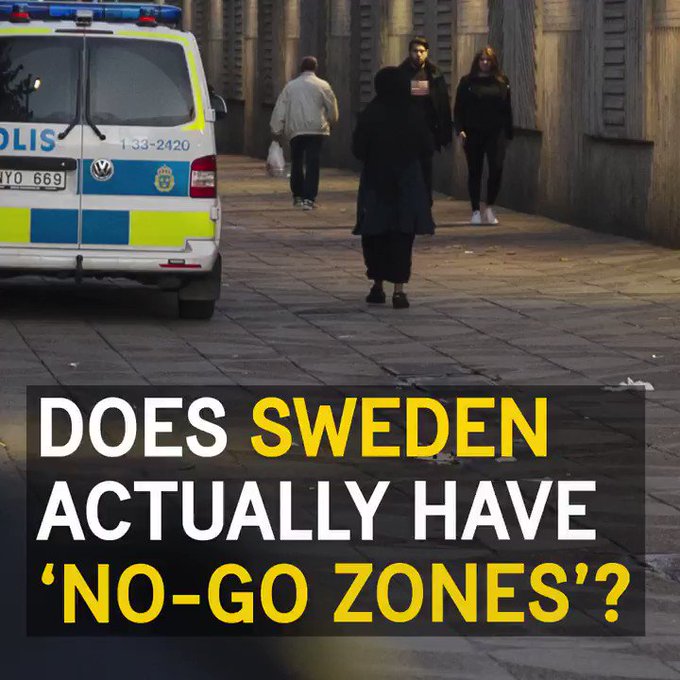It appears to be coming closer to fruition as the following article shows:When reading the last transcript, the situation in Scandinavia came to mind. Christians will likely soon be chased out of their home countries and a caliphate will take the place. This could even happen through the ballot box.

Controversy-Addled Pro-Islam Party Sets Sights on Swedish Parliament
The Nuance Party founder, who was expelled from the Centre Party over alleged contacts with Turkish nationalists the Grey Wolves, admittedly wants to recruit several fellow Muslim outcasts, who had to resign in acrimony.
Controversy-Addled Pro-Islam Party Sets Sights on Swedish Parliament
© Sputnik/ Mikhail Voskresenski
EUROPE
10:13 13.09.2019Get short URL
The Nuance Party founder, who was expelled from the Centre Party over alleged contacts with Turkish nationalists the Grey Wolves, admittedly wants to recruit several fellow Muslim outcasts, who had to resign in acrimony.
The newly started Nuance Party (Partiet Nyans), which was established in order to promote Muslim interests in Sweden and will be formally launched on 22 September, hopes to gain ground locally and is pinning its hopes on the 2022 general election.
According to party founder Mikail Yüksel, who was expelled last year from the Centre Party over alleged contacts with the Turkish nationalists, Grey Wolves, a group labelled a “security threat” in Sweden, the party is likely to join the municipal council in Växjö, where up to a quarter of the population are immigrants.
Meanwhile, local divisions will be launched in Sweden's main cities, such as Stockholm, Gothenburg, Malmö, and Örebro. The main goal is to enter parliament in 2022.
Among other things, the Nuance Party, which bills itself “the party for the country's suburbs”, seek to make Islamophobia a crime and designate Muslims as a special group with minority status in the Constitution.
However, Yüksel, who has described himself as “a practising Muslim, ethnic Turk, and proud Swede”, doesn't want to lead the party himself. Instead, he would like to concede the chair to former Housing Minister Turkish-born Mehmet Kaplan, a Green Party heavyweight and the first Muslim to become a cabinet minister in Sweden, who in 2016 was forced to resign over a dinner with the Grey Wolves.
“Mehmet Kaplan is perfectly cut out for the job as party leader for the Nuance Party. He has experience working in government and parliament”, Yüksel explained to the newspaper Lokaltidningen.
Yüksel would also like to employ another controversial Muslim politician, Yasri Khan, who is also an outcast from the Green Party. Khan, at that time seen as a rising star, quit all his assignments with the Greens after refusing to shake hands with a female journalist, citing his religious beliefs. Yüksel has described Khan as a “good person”.
Interestingly enough, Yüksel has denied having any Islamist connections himself. By his own account, it was the Grey Wolves who sought cooperation, which he rejected.
Earlier, Yüksel spelled out his standpoint in an opinion piece in the daily newspaper Aftonbladet.
Among other things, Yüksel blamed the establishment for “failing the multicultural society”. He also identified “populism” and “xenophobia” as the roots of evil in Swedish society.
“Growing populism with xenophobic rhetoric leads to all established parties approaching each other with a copy-paste policy from the xenophobic forces that are spreading in our society. Liberals are no longer liberals and socialists are not socialists”, he claimed, pledging to step aside from the established ideologies and rejecting that idea that Nuance was a Muslim-only party.
Owing to Sweden's liberal immigration policies of recent decades, the share of immigrants and their descendants has increased from virtually non-existent to about a quarter of the population of 10 million. The percentage of Muslims has been estimated at over 8 percent or 800,000.
---
Regarding the Grey Wolves from wikipedia:
The Grey Wolves are a Turkish far-right ultranationalist organization. They are commonly described as ultranationalist and/or neo-fascist.
[...]
Established by Colonel Alparslan Türkeş in the late 1960s, it rose to prominence during the late 1970s political violence in Turkey when its members engaged in urban guerrilla warfare with left-wing activists and militants. Scholars have described it as a death squad, responsible for most of the violence and killings in this period.
One can easily imagine that there will be certain outside forces, who would be happy to support such an organisation as the Grey Wolves and a political party affiliated with it, so as to create more chaos in Europe. The strategy of tensions comes to mind.
A strategy of tension (Italian: strategia della tensione) is a policy wherein violent struggle is encouraged rather than suppressed. It is usually associated when governments, or security apparatuses within a government, allow or even encourage extremist groups to perform attacks, bombings, murders, and the like. In extreme circumstances, it can even involve agent provocateurs and false flag operations where a terrorist threat is outright invented or created. The goal in such strategies is that such a struggle will rally support behind the military or police forces opposing the radicals, to radicalize opposing movements so that they can be better marginalized, or to permit loosely allied extremist groups to attack enemies of the government. As few organizations would openly say that they are pursuing a strategy of tension, accusations generally come from opponents that such a strategy is being pursued.
The wikipedia entry about the strategy of tension is not translated into the Scandinavian languages. Purely a coincidence?






